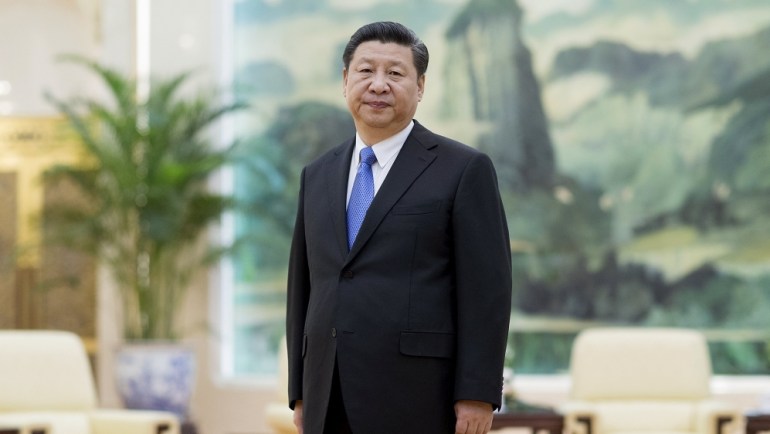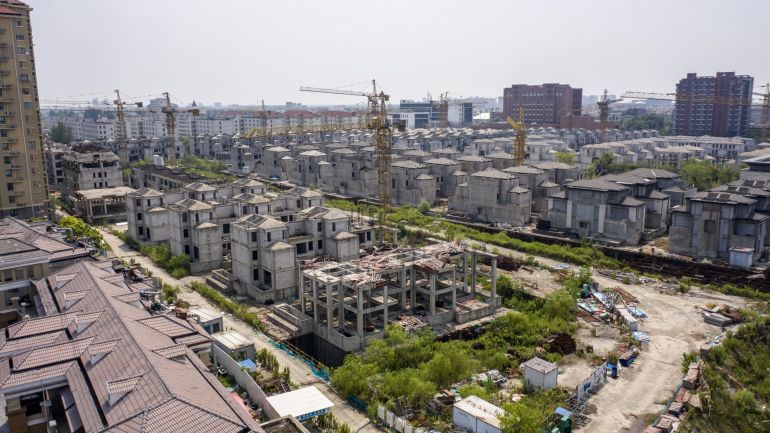China’s property market is in the midst of a slow-moving crisis.
Real estate prices have plummeted as authorities seek to rein in unsustainable debt and market speculation. Hundreds of thousands of homebuyers are refusing to pay their mortgages for pre-sold properties as developers struggle to complete housing projects on time.
With property accounting for 15-30 percent of China’s gross domestic product (GDP), the market’s woes spell trouble for the world’s second-largest economy – and potentially global growth as well.
Why is China’s property market in crisis?
China’s property troubles are, in part, the result of deliberate policy decisions. In August 2020, Beijing rolled out a “three red lines” policy aimed at carefully deflating a huge housing bubble that had been decades in the making.
The policy had twin goals: lessening the economy’s over-reliance on property and tamping down on speculation that had put house prices out of reach for many middle-class Chinese.
Under the policy, developers were required to meet strict markers of financial health, including a 100-percent cap on net debt to equity, to borrow from banks and other financial institutions.
Many developers, it turned out, had been operating far outside the “three red lines” and were saddled with enormous debts. Suddenly unable to borrow under the new rules, the sector was met with a severe cash crunch.
In December, Evergrande, one of China’s biggest developers, defaulted on interest payments due to its offshore bondholders, followed shortly after by Kaisa Group Holdings.
Property prices declined for an 11th-straight month in July and are down as much as 30 percent compared with last year.
“What China is experiencing right now is a policy-induced crisis,” Gabriel Wildau, the managing director of risk analysis company Teneo, told Al Jazeera.
“What I mean by that is, people have been warning about a housing bubble for many years, and for good reason, but the acute stress that the market is under right now is the direct result of very draconian restrictions on lending to developers that were imposed about a year and a half ago.”

The sector’s troubles have spiralled since then as cash-strapped developers have struggled to complete projects on schedule.
After beginning in the southeastern city of Jingdezhen earlier this year, protests by buyers of pre-sale properties have spread to almost 100 cities and grown to involve some 300 homeowners’ groups.
Deutsche Bank has estimated that the value of the mortgages affected by the boycotts amounts to 1.8 to two trillion Chinese yuan ($270bn-300bn), or about 5 percent of all mortgage lending.
“The crux of the problem is that property developers have insufficient cash flows – whether because of debt-servicing costs, low housing sales, or misuse of funds – to continue with projects,” Tommy Wu, the lead economist at Oxford Economics, said in a note earlier this month.
“Resolving this problem will rebuild homebuyers’ confidence in developers, which will help support housing sales and, in turn, improve developers’ financial health.”
Could this drive a global economic crash?
China’s property woes pose a substantial risk to its economy, which is already under strain due to Beijing’s harsh “zero-COVID” policies and slowing global growth. By some estimates, real estate accounts for 30 percent of GDP – about twice the equivalent share in the United States.
While some analysts believe the market has reached the bottom, the sector’s woes are expected to persist for some time. In July, S&P Global Ratings estimated that property prices would decline 30 percent this year – a worse decline than during the 2008 financial crisis.
“That’s just a huge chunk of the economy that’s kind of underwater now,” Teneo’s Wildau said. “Even continuing on the pace we are on is, I think, unsustainable. It would mean growth was substantially below target for this year if it continues like this.”
Since Chinese property developers hold relatively small amounts of overseas debt, the global economy is not considered to be at a high risk of the kind of financial crisis sparked by the collapse of Lehman Brothers in the United States, said Alicia García-Herrero, the chief Asia Pacific economist at Natixis in Hong Kong.
But the size of China’s economy, which accounts for almost one-fifth of global GDP, means a major slowdown could still have a serious effect on global growth.
“The global impact is mostly due to very low growth from China, it’s not so much a financial impact,” García-Herrero told Al Jazeera.
“Of course, if Chinese banks finally can’t swallow this shock and their non-performing loans increase massively and there’s a financial crisis in China – which I don’t think will happen immediately – it will be more like Japan in the 80s and 90s. So saddled with bad loans, no credit, the economy doing very poorly, deflation – this is, I think, the scenario. So not an immediate Lehman type event.”
The World Economic Forum has estimated that every 1 percentage-point decline in China’s GDP results in a 0.3 percent reduction in global GDP.
In a 2019 study by the United States Federal Reserve, economists estimated that an 8.5 percent fall in China’s GDP would result in a 3.25 percent drop in advanced economies and nearly 6 percent decline in emerging economies.

China’s economy is unlikely to experience an economic meltdown of that severity. But it could be on track for a protracted slump that drags on global growth in the coming years, according to analysts.
Teneo’s Wildau said that Chinese policymakers have tools not readily available in more capitalistic countries to avert a full-blown financial crisis.
“Chinese leaders have a much greater degree of control over the financial system and the real economy than US policymakers did in 2008. So they have the tools to stave off an acute crisis,” he said.
“They have the tools to stave off financial contagion and a complete collapse in credit flows because they can simply order the banks to lend. They can work outside the legal bankruptcy system to keep everyone liquid, to avoid disorderly chains of default.”
But Wildau said China could still be looking at years of economic stagnation, which would feel like a recession to many Chinese after decades of strong growth.
“We could just see an extended period of slow growth, something more like a Japan scenario, a sort of grinding slowdown over many years even absent acute financial distress or panic in the market,” he said.
What is China doing about the crisis?
Beijing has signalled that supporting the property market is an important task despite its determination to reduce the economy’s reliance on the sector.
At a meeting of China’s top decision-making body in July, officials said there was a need to “stabilise” the real estate market while emphasising that local governments should take responsibility to ensure pre-sold homes are finished.
Earlier this month, Chinese media outlet Caixin reported that Beijing was preparing to issue 200 billion yuan ($29.3bn) in loans to complete unfinished housing projects.
Beijing has also taken measures to boost the economy more generally, such as lowering interest rates and rolling out stimulus, including the announcement last week of 300 billion yuan ($44bn) in new credit through its state-run policy banks.
“We expect additional funding will be arranged to support the completion of unfinished houses,” Wu, the Oxford Economics economist, said in a note.
“Indeed, the statement from July’s Politburo meeting stresses the need to stabilise the property market and to ensure the delivery of houses. We think these efforts are unlikely to come directly from the central government. Instead, authorities will likely ask local governments, banks, and property developers to coordinate and ensure that unfinished housing projects are completed.”
China’s efforts to prop up the market may ultimately be limited, with Beijing widely expected to stick to its “three red lines” and Chinese President Xi Jinping’s mantra that “houses are for living in, not for speculation”.
Wildau said China’s policymakers now faced the dilemma of whether to press ahead with their crackdown on real estate or reverse course for the sake of growth.
“If they were to embark on a bailout now, it would be rowing back and retreating on those gains,” he said.
“It would also be politically embarrassing because it would look like a reversal or an admission of error. So that’s why I think we’ve seen policy be relatively lacklustre. We haven’t seen a housing bailout that a lot of investors have been hoping for.”
As China’s property crisis grows, is the global economy at risk? - Al Jazeera English
Read More
No comments:
Post a Comment